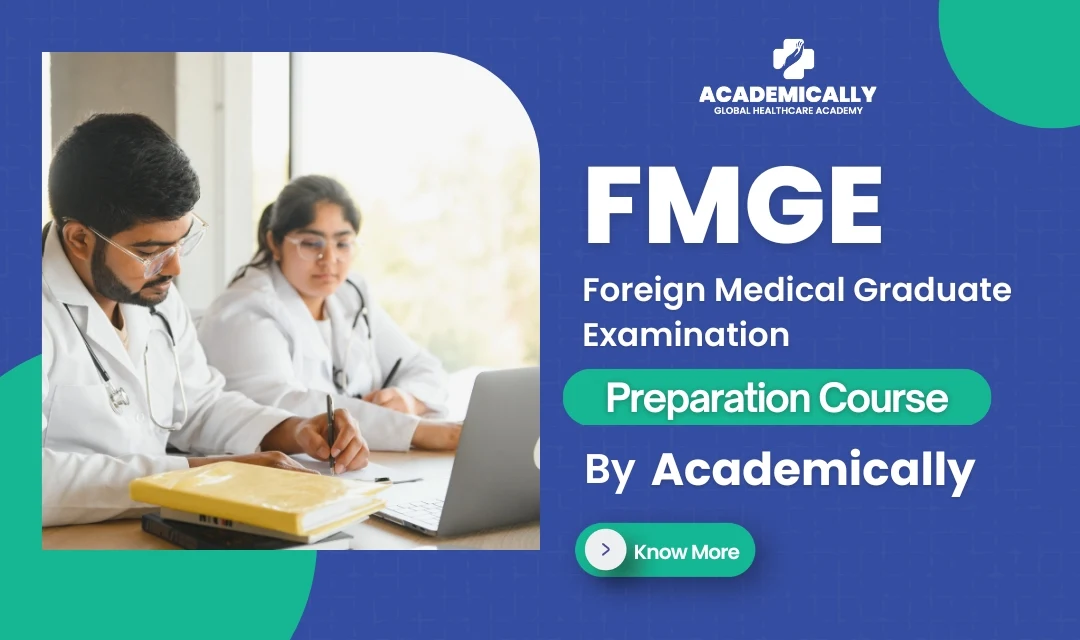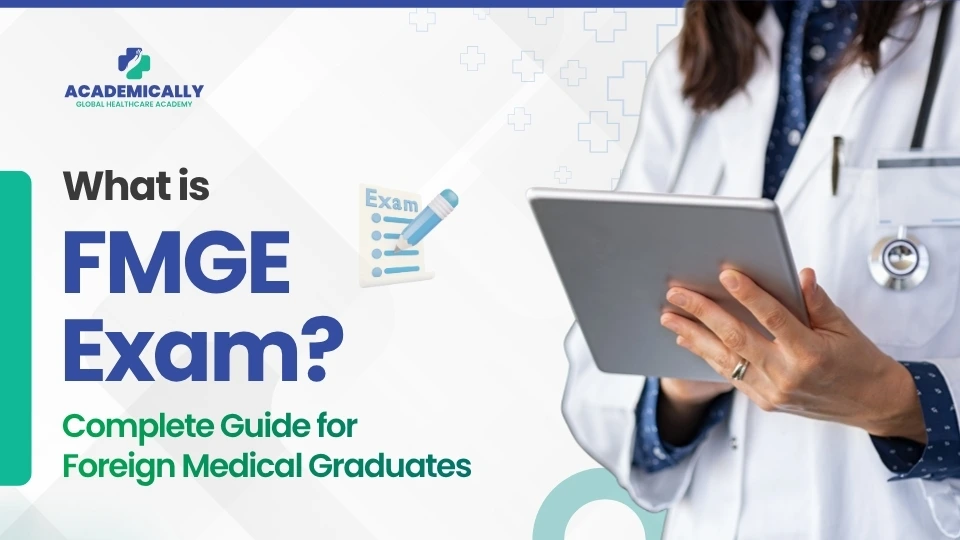If you’re an Indian citizen who earned your medical degree from a foreign university, you’ve likely heard of the FMGE or the Foreign Medical Graduate Examination.
This examination is your gateway to becoming a registered medical professional in the country.
Whether you’ve just completed your MBBS abroad or are in the planning stages, this guide will help you with the next steps.
This blog is your complete guide for the FMGE. So, whether you are taking the exam this year, or are merely curious, this blog is perfect for you.
What is FMGE Exam?
The Foreign Medical Graduate Examination is also known as MCI screening test conducted by the National Board of Examinations in Medical Sciences. It is for Indian citizens and OCI holders who have obtained their medical degree outside India. The exam is mandatory if you wish to practice medicine in India.
After passing the exam, you can register with the National Medical Commission (NMC) or State Medical Councils (SMCs). FMGE is a screening exam. You just need to score a minimum qualifying mark to pass.
The Purpose of FMGE
The FMGE serves an important role in standardizing medical practice in India.
It has become even more important with the increasing number of students going abroad for medical education.
The purpose of FMGE is to:
- Ensures foreign graduates meet Indian medical standards
- Protects the integrity and quality of healthcare delivery
- Bridges the gap between different medical education systems
- Helps verify genuine foreign qualifications
- Compulsory step before internship or medical practice in India
Passing the FMGE opens the gateway to a plethora of opportunities. From licensing, internships, and job opportunities in India, you need the FMGE qualification for all.
Who Needs to Take the FMGE Exam?
Wondering whether you need to take the FMGE? Here's a simple checklist:
- Required for Indian citizens or OCI holders with a foreign medical degree
- Completed primary medical qualifications outside India
- Those with degrees from non-NMC-recognized institutions
- Includes students from Ukraine, Russia, Georgia, and others
You need to take the FMGE if you fall into any of the above categories.

Medical Graduates Exempt from the FMGE
There are a few countries whose registered medical practitioners are exempt from the FMGE:
- USA
- UK
- Australia
- Canada
- New Zealand
FMGE Eligibility Criteria
Now let’s look at the eligibility requirements for FMGE 2025:
1. Nationality
- Must be an Indian Citizen or hold Overseas Citizen of India status.
2. Medical Qualification
- Must hold a primary medical degree (MBBS equivalent) from a recognized institution located outside India.
- Qualification must be recognized by the concerned medical authority of the country where the institution is located.
- Must be listed in the World Directory of Medical Schools (WDOMS).
3. Eligibility Certificate for Older Students
- Produce an Eligibility Certificate issued by the NMC if you joined your course before March 2019.
4. Course Completion
- Should have completed the entire course. This includes clinical rotations or internships, where applicable.
Documents Required
To apply, you will need:
- Passport
- Visa
- MBBS or equivalent degree certificate
- Final year mark sheets
- Eligibility certificate
- Proof of internship (if completed abroad)
- A certificate from the Indian Embassy of the country of study validating your degree
Good news for candidates. There’s no age limit and no restriction on the number of attempts for FMGE. You can reappear if you do not qualify on your first try.
FMGE Application Process
FMGE Exam Format and Structure Overview
Let us understand the exam pattern and the syllabus.
Exam Format
| Exam Particulars | Details | Remarks |
| Conducted by | NBEMS | Governed by National Medical Council |
| Exam Frequency | Twice a year | June and December |
| Mode of Exam | Online | Computer based exam |
| Exam Duration | 300 minutes or 5 hours | The exam is divided into two sittings of 150 minutes each. Break in between. |
| Number of Questions | 300 | Multiple Choice Questions |
| Pass Marks | 150/300 or 50% | No negative marking |
Subjects Covered: Based on the MBBS syllabus. It includes pre-clinical, para-clinical, and clinical subjects.
| Preclinical | Para-clinical | Clinical |
| Anatomy Physiology Biochemistry | Pathology Microbiology Pharmacology | Medicine Surgery Obstetrics & Gynaecology Pediatrics |
The FMGE Challenge
FMGE has a low pass percentage of 25%. This can be due to several reasons:
- The syllabus differs compared to many foreign universities.
- More focus on theory and less on clinical exposure, which is essential in FMGE.
- Lack of access to quality preparation resources for Indian exams.
- The overwhelming volume of subjects.
- The question format is unfamiliar to foreign graduates.
- Language and terminology differences in medical training abroad
- Psychological pressure due to a low pass percentage
- Struggle with Indian-style MCQs
This makes structured preparation and coaching crucial for success.
Succeed in Your First Attempt at FMGE
Don’t let these reasons scare you from taking the FMGE. You can clear it on your first attempt with proper preparation. Here are a few tips to help you succeed.
- Start early and build strong conceptual clarity
- Stick to the NMC syllabus guidelines
- Solve past-year papers and practice tests
- Join FMGE-specific online coaching
- Revise high-yield topics repeatedly
- Use Indian standard textbooks where possible
Start Your Medical Career In India
The FMGE Exam 2025 is more than just a test. It’s a gateway to a medical career in India.
To pass this exam, you need to strategize your preparation. And what better way to do so than with the best? Academically provides online FMGE coaching. From self-paced preparation materials to AI-based mock exams, community groups to support you throughout your journey, you’ll find it all there.
Your dream of being a doctor in India is within your reach. Start now and realise it.





